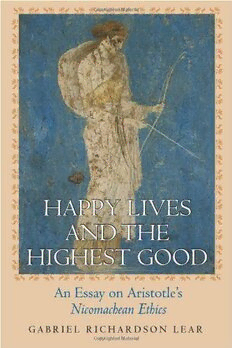Download Happy Lives and the Highest Good: An Essay on Aristotle's "Nicomachean Ethics" PDF Free - Full Version
Download Happy Lives and the Highest Good: An Essay on Aristotle's "Nicomachean Ethics" by Gabriel Richardson Lear in PDF format completely FREE. No registration required, no payment needed. Get instant access to this valuable resource on PDFdrive.to!
About Happy Lives and the Highest Good: An Essay on Aristotle's "Nicomachean Ethics"
Gabriel Richardson Lear presents a bold new approach to one of the enduring debates about Aristotle's Nicomachean Ethics : the controversy about whether it coherently argues that the best life for humans is one devoted to a single activity, namely philosophical contemplation. Many scholars oppose this reading because the bulk of the Ethics is devoted to various moral virtues--courage and generosity, for example--that are not in any obvious way either manifestations of philosophical contemplation or subordinated to it. They argue that Aristotle was inconsistent, and that we should not try to read the entire Ethics as an attempt to flesh out the notion that the best life aims at the "monistic good" of contemplation. In defending the unity and coherence of the Ethics , Lear argues that, in Aristotle's view, we may act for the sake of an end not just by instrumentally bringing it about but also by approximating it. She then argues that, for Aristotle, the excellent rational activity of moral virtue is an approximation of theoretical contemplation. Thus, the happiest person chooses moral virtue as an approximation of contemplation in practical life. Richardson Lear bolsters this interpretation by examining three moral virtues--courage, temperance, and greatness of soul--and the way they are fine. Elegantly written and rigorously argued, this is a major contribution to our understanding of a central issue in Aristotle's moral philosophy.
Detailed Information
| Author: | Gabriel Richardson Lear |
|---|---|
| Publication Year: | 2005 |
| ISBN: | 9780691126265 |
| Pages: | 250 |
| Language: | English |
| File Size: | 0.908 |
| Format: | |
| Price: | FREE |
Safe & Secure Download - No registration required
Why Choose PDFdrive for Your Free Happy Lives and the Highest Good: An Essay on Aristotle's "Nicomachean Ethics" Download?
- 100% Free: No hidden fees or subscriptions required for one book every day.
- No Registration: Immediate access is available without creating accounts for one book every day.
- Safe and Secure: Clean downloads without malware or viruses
- Multiple Formats: PDF, MOBI, Mpub,... optimized for all devices
- Educational Resource: Supporting knowledge sharing and learning
Frequently Asked Questions
Is it really free to download Happy Lives and the Highest Good: An Essay on Aristotle's "Nicomachean Ethics" PDF?
Yes, on https://PDFdrive.to you can download Happy Lives and the Highest Good: An Essay on Aristotle's "Nicomachean Ethics" by Gabriel Richardson Lear completely free. We don't require any payment, subscription, or registration to access this PDF file. For 3 books every day.
How can I read Happy Lives and the Highest Good: An Essay on Aristotle's "Nicomachean Ethics" on my mobile device?
After downloading Happy Lives and the Highest Good: An Essay on Aristotle's "Nicomachean Ethics" PDF, you can open it with any PDF reader app on your phone or tablet. We recommend using Adobe Acrobat Reader, Apple Books, or Google Play Books for the best reading experience.
Is this the full version of Happy Lives and the Highest Good: An Essay on Aristotle's "Nicomachean Ethics"?
Yes, this is the complete PDF version of Happy Lives and the Highest Good: An Essay on Aristotle's "Nicomachean Ethics" by Gabriel Richardson Lear. You will be able to read the entire content as in the printed version without missing any pages.
Is it legal to download Happy Lives and the Highest Good: An Essay on Aristotle's "Nicomachean Ethics" PDF for free?
https://PDFdrive.to provides links to free educational resources available online. We do not store any files on our servers. Please be aware of copyright laws in your country before downloading.
The materials shared are intended for research, educational, and personal use in accordance with fair use principles.

